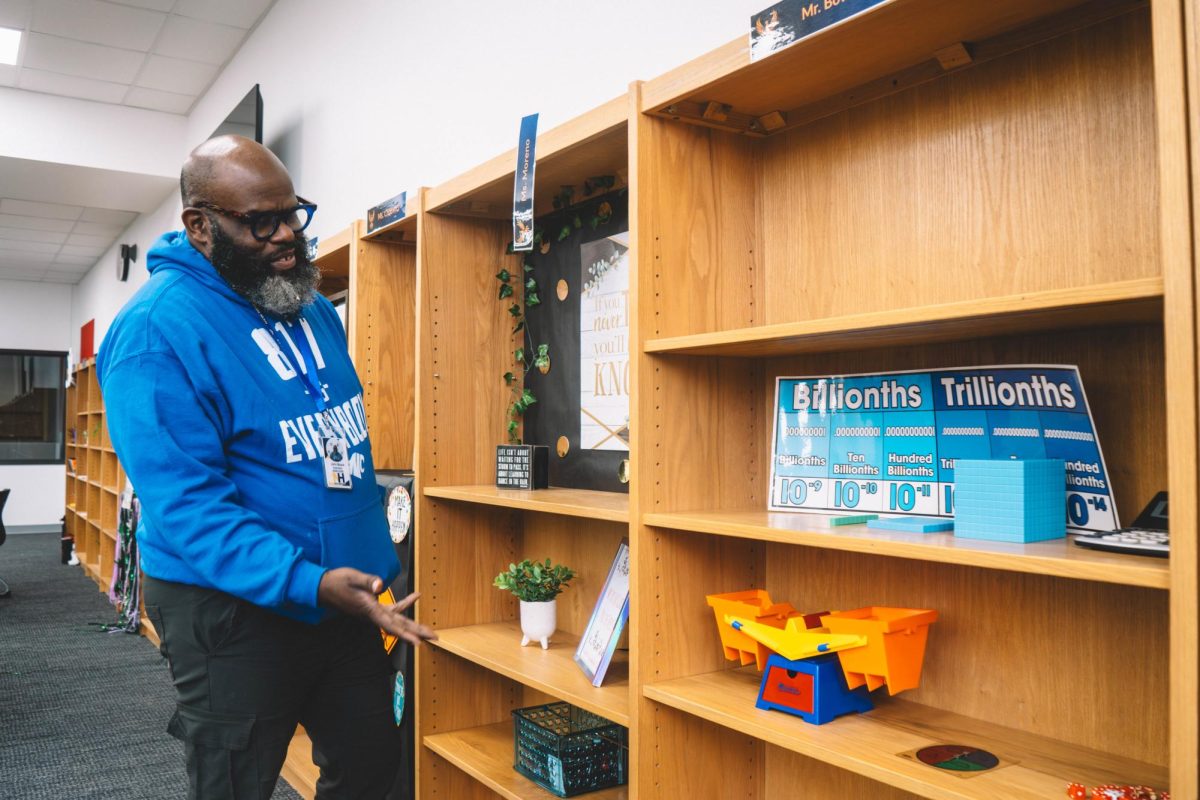
DIEGO SANTOS
Math instructor of New Heights John Bowie shows his math collection shelf in the Learning Center where students can borrow the items to study.
The New Heights Adult High School opened its new campus doors Oct. 13 to hallways students walked through before, but this time, in a different light.
Repurposed from a 1922 sixth-grade building, the program renamed many rooms for the 300 enrolled 18 to 50-year-old students returning to finish their high school diploma.
“You don’t think about how that can be triggering,” said New Heights math teacher John Bowie. “How many hurts and pains come from that.”
He said they’ve adopted new words for the school’s rooms, like Odyssey, meaning an adventurous journey, in place of the name cafeteria.
“It changes that narrative for a lot of our students,” Bowie said. “So, just kind of reintroducing some of those things that they may have been leery of because of their past experience.”
New Heights student Cipriano Vedia was accepted into the program last year, and he said the new campus will provide more people like him with the ability to succeed.
“The option of just going to get my GED was always an option on the table,” Vedia said. “This opportunity is something that I always really wanted because I always wanted that high school diploma.”
While the GED test is thought to be equivalent to a high school diploma, studies show it’s not. According to “Dropping Out,” a book by Russell Rumberger, employers seek job applicants with perseverance, and it’s not seen from resumes with GED diplomas.
The partnership New Heights has with TCC allows adults to graduate high school with a career or technical certificate of their choosing.
“When I was in school the last time, I was more encouraged to just drop out,” Vedia said. “These people here are like, ‘No, come back. We’re going to help you. We’ll figure it out.’”
He said New Heights teachers, advisers and TCC advisers work hard for students’ success and always find ways to positively develop their future.
“Everybody’s included. There’s no discriminating,” Vedia said. “I did have a teacher that would stay an extra 30 minutes to an hour working with me just to help me out, to try to make sure I was understanding the lesson and passing.”
Advisers find and pull all of the students’ previous records to start them in the program where they left off years before.
“These are the, in my opinion, some of the real heroes,” Bowie said. “The key is to shorten that time as much as possible for them.”
They also help find resources for students.
“We have students that are in all sorts of circumstances, so they have access to all the other services we have,” Bowie said. “Food pantries. Help with paying bills. Mental health. [Advisers] service the whole student.”
Principal Gillian Smoak transferred to the Fort Worth New Heights program from a Dallas school district.
“When I live here, I want to know that I’m making my community better,” she said. “Adults who have high school diplomas are making not only themselves better, but their family better, their community better.”
Smoak said the Fort Worth police chief told her the opportunities New Heights gives adults are aiding the community in ways the police force can’t.
“He made a great analogy about how the police and the things they do are kind of like the fever reducer,” she said. “But the things that we’re doing here, we’re really the true fixes. We’re the true clinical things that are changing.”
Vedia spoke with Smoak about the new campus and he said hearing about everything New Heights is doing makes him feel seen in a way he never had before.
“I’ve been out of school for almost 20 years. It was the hardest thing for me coming back to a classroom setting when I was so out of touch,” he said. “I have a stronger mind. I feel like it’s my destiny now, and I’m able to do anything.”